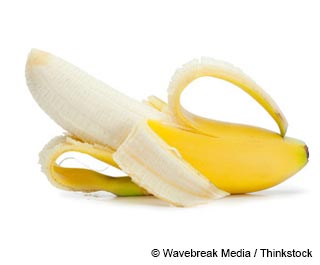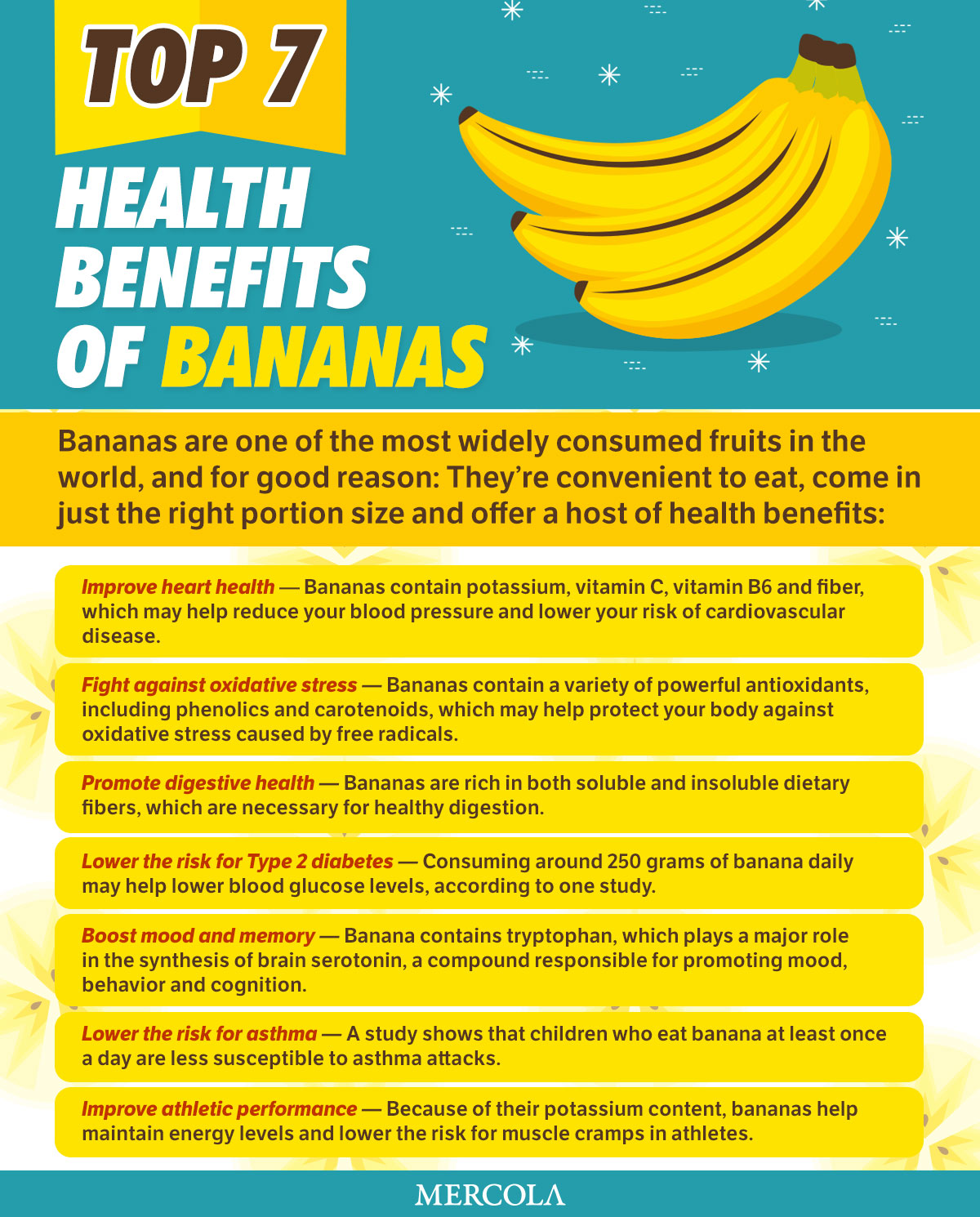Banana-Rama
Botanical name: Musa acuminata colla

There are many reasons why bananas are one of the most popular foods in the world: They offer the perfect portion size, come in their own handy, natural protective wrap and are extremely economical.
Bananas are among the most cultivated tropical fruits worldwide, with over 105 million tons of bananas being produced every year.1 However, don't mistake bananas for its close relative, the plantain. Belonging to the Musa family, bananas and plantains share the same elongate-cylindrical shape and may appear straight or with a distinct curve.2
Fresh and creamy, bananas go well with other fruits and are a favorite lunchtime addition or for eating on the go. Read on to learn more about the benefits of bananas to your health.
Health Benefits of Bananas
Over centuries, humans have consumed bananas and benefited from their wide array of nutrients. In fact, bananas are considered to be one of the main sources of calories in the human diet. Aside from this, certain varieties have been linked to a lowered risk of diabetes, heart disease and cancers because of the high levels of carotenoids they contain.3
Additionally, bananas contain health-promoting flavonoids and phenolics such as lutein, quercetin, beta-carotene and alpha-carotene,4,5 all of which act as free radical-fighting antioxidants.6 They're also high in vitamin C, which is known for its infection-fighting properties, and vitamin B6 (pyridoxine), which may help lower the risk of anemia and coronary artery disease.7,8,9
A 100-gram serving of raw banana contains 358 milligrams of potassium,10 a mineral that may help regulate your blood pressure, which in turn lowers your risk of stroke and coronary heart disease.11 Bananas are excellent sources of dietary fiber, which may help maintain optimal gut health.12 Some of the other nutrients that bananas provide include:
- Magnesium — Regulates muscle contraction and relaxation, cardiac rhythm and brain function. High magnesium intake may also help decrease the risk of arrhythmia, heart failure and hypertension.13
- Manganese — Plays a role in the metabolism of carbohydrates, amino acids and cholesterol. It also influences enzymes needed in metabolic processes.14
- Folate — Necessary for amino acid synthesis and vitamin metabolism. It facilitates growth and development during pregnancy as well.15

If you're planning to add bananas into your diet, you should learn more about their nutritional content. Check out the table below:16
Banana Nutrition Facts
Serving Size: 3.5 ounces (100 grams), raw
| Calories |
89 |
|
| Total Fat |
0.33 g |
|
| Cholesterol |
0 mg |
|
| Sodium |
1 mg |
|
| Total Carbohydrates |
22.8 g |
|
| Dietary Fiber |
2.6 g |
|
| Protein |
1.09 g |
|
| Calcium 5 mg |
Potassium |
358 mg |
Studies Done on Bananas
In a 2005 study published in the International Journal of Cancer, it was found that among fruits and vegetables proven to be associated with cutting your risk of renal cell carcinoma, bananas were the highest.17 Another study published in the Food and Nutrition Bulletin in 2003 showed that bananas, which are rich in vitamin A and carotenoids, have the potential to help lower your risk of chronic diseases like diabetes, cardiovascular disease and other types of cancer.18
More positive proof of banana's singular health benefits emerged in a 1998 study from Circulation, showing an important link between foods containing high levels of potassium, magnesium, calcium and fiber — like bananas, for instance — and a reduction in the risk of stroke in men.19
How to Pick Good Bananas
Bananas come in different sizes, colors and shapes, depending on how ripe they are, so choosing the best ones can be tricky. Here are some tips you can follow to ensure that you pick out the right banana that suits your taste:20
- Check the color — Choose bananas that have a vibrant yellow color. If you're planning on eating them right away, choose bunches that have little to no green at the ends. Brown spots on the bananas also indicate ripeness and sweetness. If you're planning on storing them, though, go for the bunch with a little more green at the ends.
- Don't get bruised or split bananas — While the brown spots on bananas are a good sign, big sunken ones aren't. These usually mean that the bananas are bruised.
- Avoid bananas with dull gray undertones — A gray undertone may indicate that the bananas were improperly stored, usually frozen or overheated, before they ripened. This may interfere with the normal ripening process, which may lead to a change in texture and taste.
Keep bananas at room temperature to avoid premature brown spots from developing. You should also keep them away from other fruits, as they will ripen quickly with other fruits around.21
Healthy Banana Recipes:
Flourless Banana Pancakes

|
Ingredients:
|
|
✓ 1 1/2 large ripe bananas
|
✓ 2 free-range eggs
|
✓ 1/2 teaspoon organic vanilla extract
|
|
✓ 1/8 teaspoon baking powder
|
✓ 1/3 cup raw honey
|
|
Prep Time: 10 minutes | Cook Time: 10 minutes |
Total Time: 20 minutes | Serves: 1
Procedure:
- Crack the eggs in a bowl and whisk them. In another bowl, lightly mash the bananas with a potato masher or a fork.
- Add the whisked eggs, baking powder, vanilla extract and cinnamon to the bowl of mashed bananas and stir to combine.
- Pour 2 tablespoons of the batter at a time onto a skillet placed over medium-low heat and cook until the bottom appears set, about one to two minutes. Flip with a spatula and cook for another minute. Serve immediately.
(Recipe adapted from Paleo Leap22)
Banana Fun Facts
Originally from Southeast Asia, bananas were distributed to the different regions of the world through conquerors, explorers and missionaries. It was first taken to Asia Minor and Africa by Arab conquerors, and then subsequently transported to the New World. Its mass production and cultivation only started in the early 1800s.23
Summary
Bananas provide a long list of health-boosting nutrients, including potassium, fiber, flavonoids, and vitamins A, C and B6.24 A century ago, this convenient fruit was practically unknown throughout North America and Europe.25 Nowadays, it's considered a staple and one of the most important crops in the world.26
There are many ways to incorporate this fruit into your diet — you can eat it as is, bake it into a dessert or even dehydrate it to be eaten along with trail mix. Keep in mind, though, that bananas should be eaten in moderation because they contain fructose, which can be harmful to your health when consumed in excessive amounts.